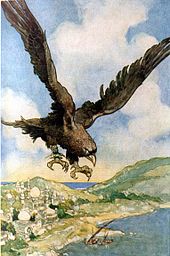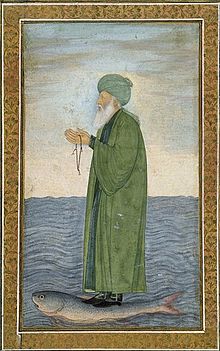 |
| Basra. Web Source: Wikipedia. |
You have undoubtedly heard of my illustrious predecessor, Sindbad the Sailor. I too had heard of his fabulous adventures among mystical, magical places, and most of all of his limitless wealth. If I could just have had one of his invaluable diamonds I would have been a happier person.
Unfortunately for me, I was born the son of a baker in 19th century Iraq, and had no diamonds nor any other source of wealth. On an ordinary day, I worked in my father's shop during the day and walked along the beach in the evening. The sea is far and away the best part of living in Basra.
One day, one of my customers stopped me as I was putting his loaves in a bag. "I believe I have seen you before, in the port. Are you a sailor?"
"No sir. I do visit the port occasionally."
"What is your name?"
"Sindbad, sir."
"Sindbad? What a coincidence, so is mine."
It was from him that I learned that Sindbad the Sailor is more than a single man. He passed on his wealth and blessing to the Sindbad to whom he told his stories in Alf Layla wa Layla, and from then on there has a been a Sindbad who sails around, finding adventures and wealth. Treasure by way of the sea was an offer I could not refuse, but there was more.
"Just as Sindbad was sent by Harun Al-Rashid, Allah yarahamhu, to Serendib, there is need of Sindbad the Sailor's aid in Serendib today."
You may know Serendib as Ceylon, the name the British gave it, or Sri Lanka, the name it has as an independent nation in your time. As we in Iraq were well aware, the British were very interested in that time in spreading their imperial reach, particularly through the powerful East India Company. My mission was to join King Sri Vikrama Rajasinha of Kandy, the Serendib kingdom of the time. I set off on a ship that my predecessor Sindbad recommended to me.
If you are familiar with the stories of Sindbad, you will not be surprised that I was shipwrecked on my way to Kandy. Even though I now knew that Sindbad was a historical figure, I still doubted that all of his tales were true. As I mentioned, I was more interested in treasure than in mythical figures. But in my search for treasure, I fell down a cliff into a valley filled with giant snakes. As you might imagine, I immediately began running for my life. As I ran, a great shadow fell upon us. The snakes began hissing in terror, and to my shock I could understand them. They were as terrified of the shadow - the roc - as I was of them. The roc swooped low, and dropped something large down on the valley. It was an elephant. The snakes slithered away into caves, but I stayed, my eyes wide with amazement at this huge creature, who began nuzzling me with his trunk.


The elephant too could talk. I was equally surprised by its grasp of geopolitics as by its gentleness. The roc in its flight had seen the actions of the British, and the elephants had seen the rise in hunters seeking ivory. They had come to rally the snakes, but the snakes were too frightened of the roc to parlay. The elephant had come as a mediator, and enlisted me as an aide. I told him of my mission to help save Kandy, which stirred all of their sympathies.
With the help of the elephants, roc and kin, and giant snakes, the Kandyan army succeeded in besting the might of the British empire, at least for a time. They did not succeed in keeping their independence, but I am sure one of my successors will be around when they regain it.
And as for me? In gratitude for my help in mediating between them and their enemy the roc, the snakes gave me a handful of magnificent diamonds that kept me and my family in comfort. I returned to the bakery, and found it a relaxing respite after my adventures. With the money from the diamonds, I was able to help those of my neighbors and customers who were in need, until the time when I would take up the mantle of Sindbad once again.
Author's Note: In the original story, Sindbad tells his tales to another man, also named Sindbad. I thought it made sense that this Sindbad would also go one to have adventures, and would pass the title down. I put it in a different historical context to connect in Serendib, and had the elephant as an intermediary between the roc and the snakes since the elephants were originally on a different island.
Author's Note: In the original story, Sindbad tells his tales to another man, also named Sindbad. I thought it made sense that this Sindbad would also go one to have adventures, and would pass the title down. I put it in a different historical context to connect in Serendib, and had the elephant as an intermediary between the roc and the snakes since the elephants were originally on a different island.
Bibliography: Andrew Lang's The Arabian Nights' Entertainments, link.

